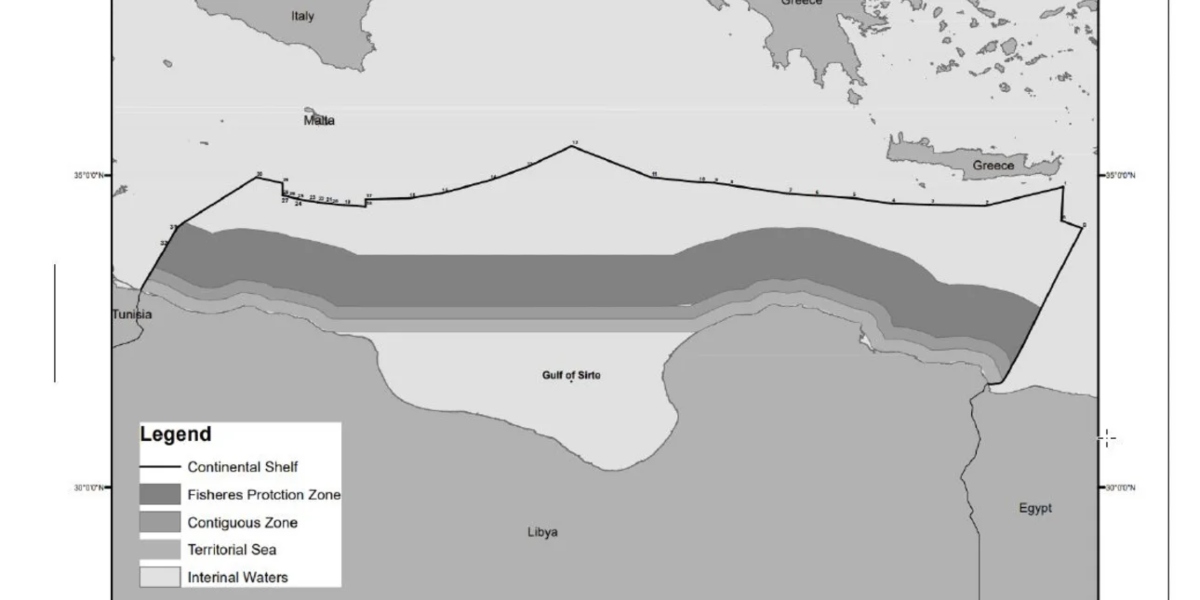On May 27, 2025, Libya submitted a Note Verbale to the United Nations, officially published on July 1, asserting maritime claims based on the 2019 Turkey-Libya Memorandum of Understanding (MoU).
The submission, guided by Turkey, includes a map and coordinates defining Libya’s outer continental shelf boundaries, extending to areas near Crete, in a move primarily targeting Greece but also affecting Egypt.
Key Points of Libya’s Submission:
- Unilateral Claims Based on Turkey-Libya MoU:
- Libya’s coordinates and map aim to enforce the maritime boundaries outlined in the 2019 MoU, which it claims grants rights at the expense of Greek and Egyptian maritime zones.
- The submission echoes Turkey’s 2020 unilateral declaration of continental shelf boundaries, which ignored Greece and Cyprus’s rights in the Eastern Mediterranean.
- Challenges to Greece and Egypt:
- Libya declares the 2020 Greece-Egypt Exclusive Economic Zone (EEZ) agreement illegal, asserting it infringes on its continental shelf.
- It rejects Greece’s April 18, 2025, EEZ declaration in the Ionian Sea and its Marine Spatial Planning (MSP) framework, labelling them violations of Libyan rights and the Law of the Sea.
- Libya condemns Greek hydrocarbon exploration (permits since November 2022, surveys approved April 2024) and Egypt’s offshore licensing, demanding both countries halt activities.
- Legal and Diplomatic Stance:
- Libya argues that maritime boundaries should be based on mainland coasts, with islands having limited or no effect on delimitation, aligning with Turkey’s position.
- It insists that any resolution must recognise the Turkey-Libya MoU and involve negotiations per Article 33 of the UN Charter, potentially involving the International Court of Justice (ICJ).
- Libya cites ICJ rulings (e.g., Libya-Malta 1985, Libya-Tunisia 1982) and claims historic rights, including over the Gulf of Sirte.
- Strategic Implications:
- By aligning with Turkey, Libya seeks to confine Greece to narrow maritime zones, barely beyond its 6-nautical-mile territorial waters, particularly south of Crete and in the Ionian Sea.
- The insistence on the MoU’s validity limits prospects for constructive dialogue, as it dismisses Greek and Egyptian claims outright.
- Egypt faces pressure over a smaller maritime area but shares Greece’s need to counter Libya’s claims.
Diplomatic Context:
- Greek Foreign Minister Giorgos Gerapetritis has engaged with both Libyan factions (Tripoli and Benghazi), signalling a new phase in the dispute. Maintaining open communication with Libya remains critical.
- The submission underscores the need for stronger Greece-Egypt cooperation to address the joint challenge posed by Libya and Turkey.
Libya’s Demands:
- Suspension of all Greek and Egyptian exploration and licensing activities.
- Negotiations with coastal states based on the Turkey-Libya MoU.
- UN publication of Libya’s Note Verbale, map, and coordinates as official documents.
Libya’s move, backed by Turkey, escalates tensions in the Eastern Mediterranean, challenging international law and maritime rights while complicating regional diplomacy.
Source: pagenews.gr
